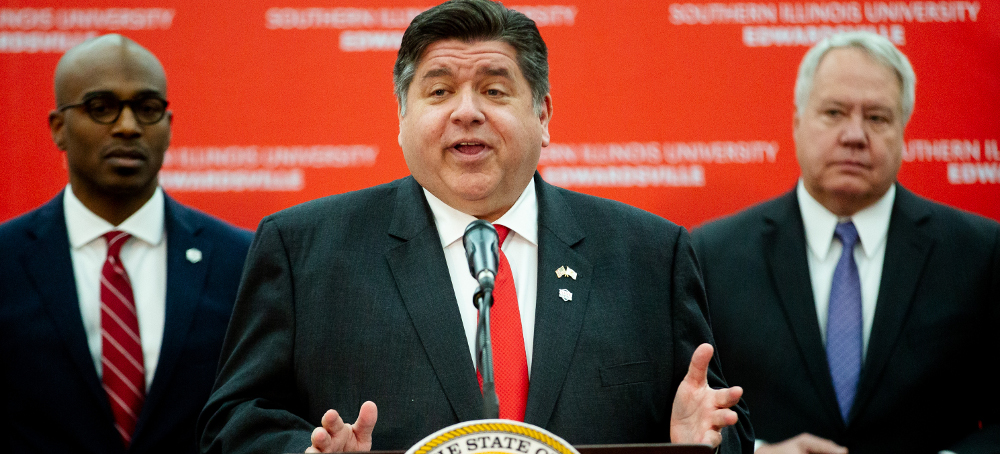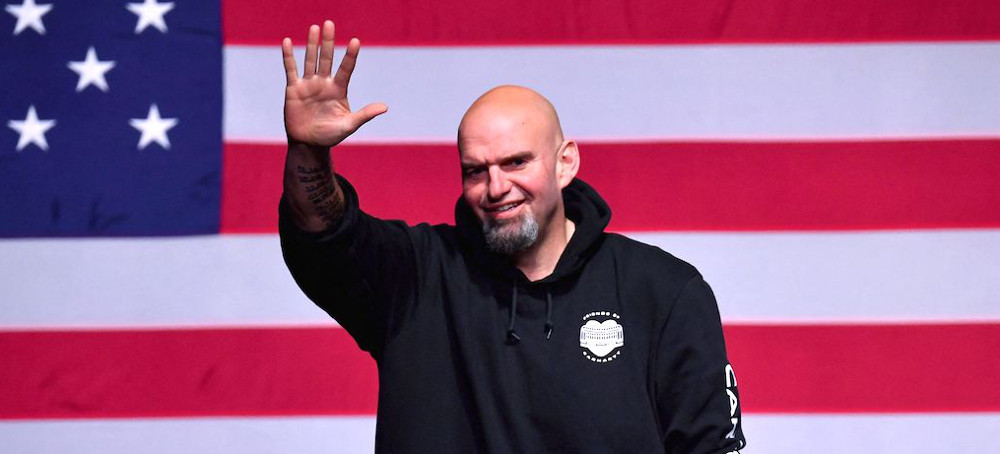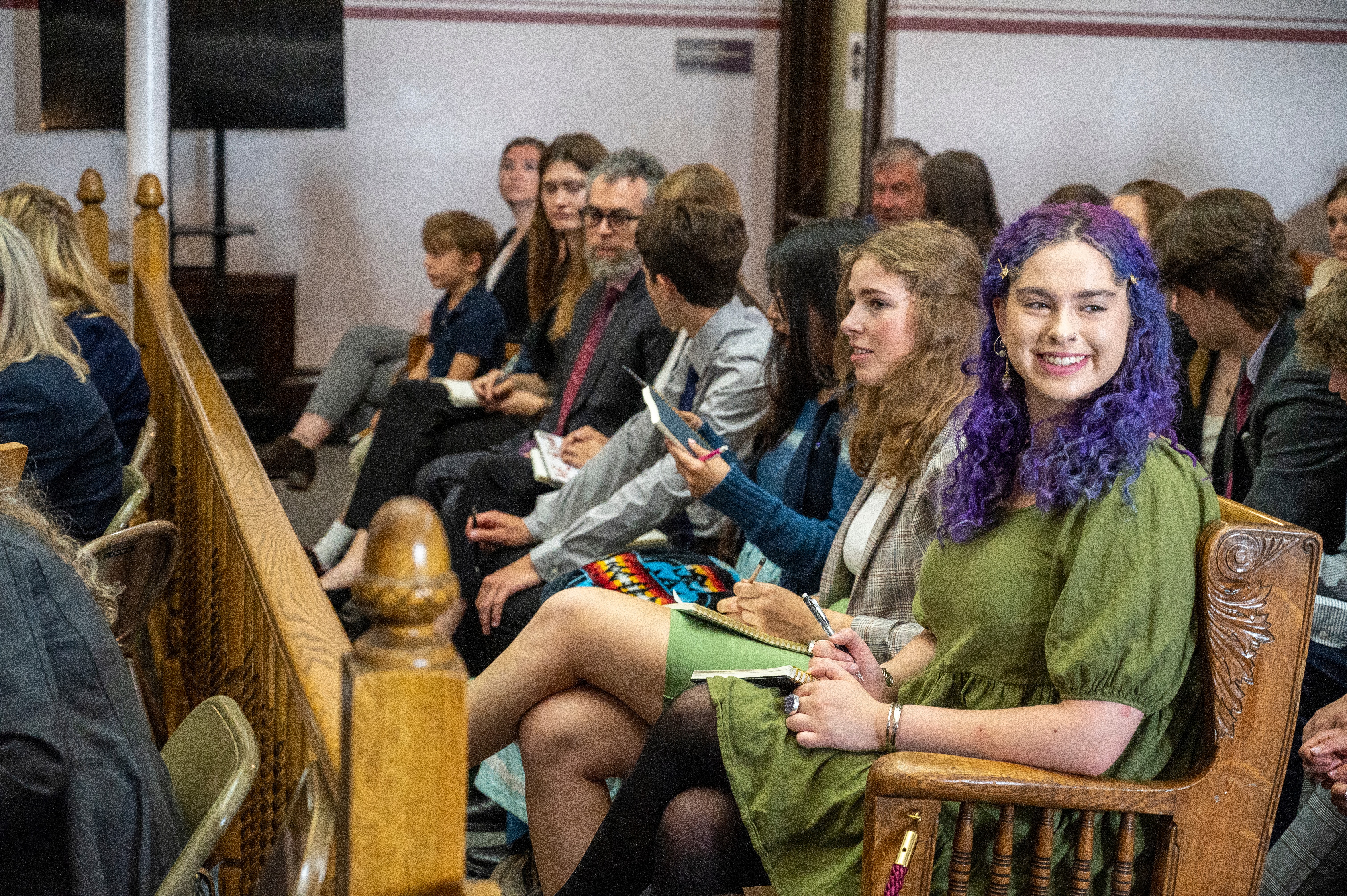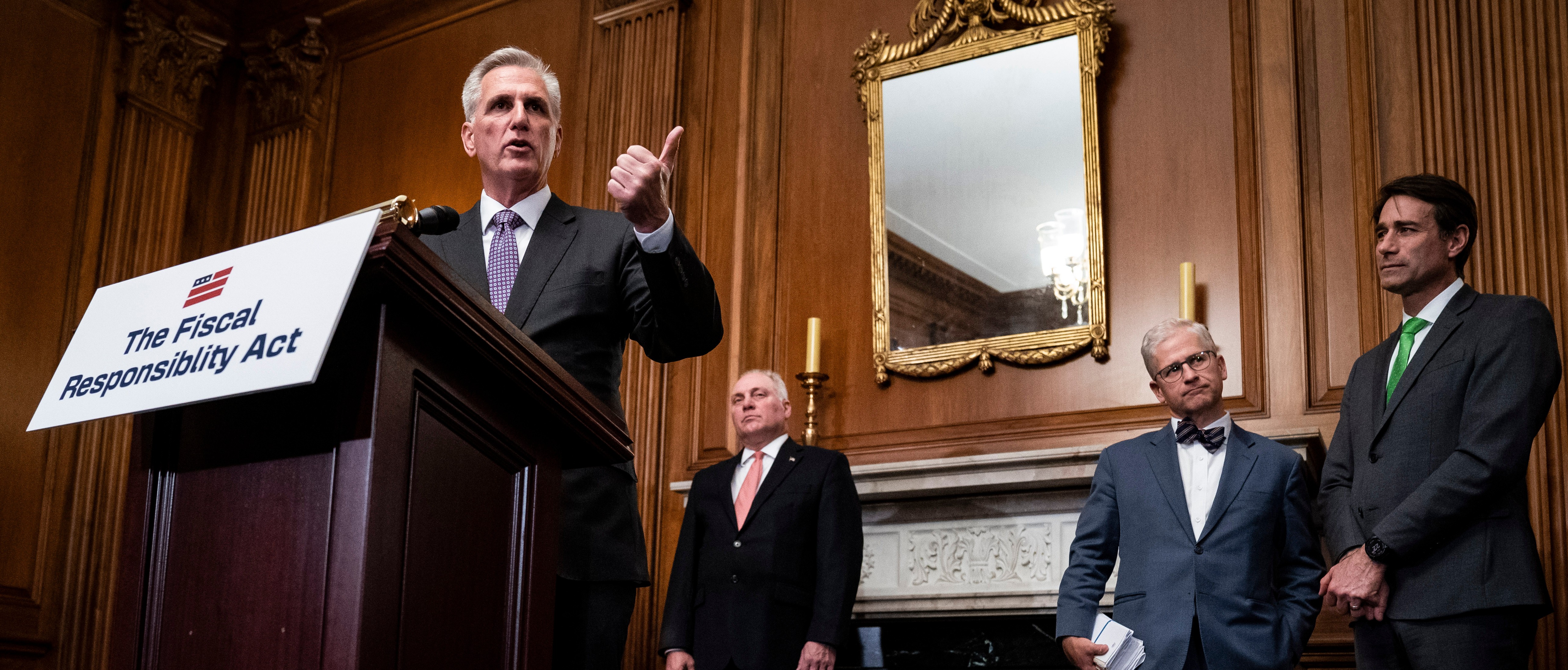Live on the homepage now!
Reader Supported News
The article below is satire. Andy Borowitz is an American comedian and New York Times-bestselling author who satirizes the news for his column, "The Borowitz Report."
Harland Dorrinson, who’d had lunch at Mar-a-Lago, said that he’d found the list of missile installations “confusing,” but added, “I just assumed they were specials.”
Carol Foyler, who’d visited the private club for dinner, was similarly baffled. “I thought maybe they were trying to turn the place into some kind of theme restaurant,” she said.
The hard-to-read menus irritated another dinner guest, Tracy Klugian. “It was the last thing I needed, especially after climbing over all of those boxes to get to my table,” he said.
READ MORE  Despite Trump's avowal to stay in the race, Scaramucci predicted that the former president would eventually bow out. (photo: Pablo Martinez Monsivais/AP)
Despite Trump's avowal to stay in the race, Scaramucci predicted that the former president would eventually bow out. (photo: Pablo Martinez Monsivais/AP)
“I know President Trump’s personality reasonably well,” Scaramucci said in an interview on NewsNation’s “Cuomo.” “Remember, it wasn’t just 11 days for me; it was 71 campaign stops and a full year’s worth of work. He does not like this. He is stressed about it.”
Scaramucci served in his White House role for just 11 days in July 2017 before being dismissed by the former president. He has since become an outspoken critic of Trump and said he is backing former New Jersey Gov. Chris Christie in the 2024 election.
Despite Trump’s avowal to stay in the race, Scaramucci predicted that the former president would eventually bow out.
“I am going to say something contrarian on your show,” Scaramucci said Monday. “I think he ends up eventually dropping out of the race.”
“And I think he ends up coming up with some type of Spiro Agnew-like plea where he’s out, doesn’t go to jail,” he continued. “Something happens to him, but not too significant.”
Former Vice President Spiro Agnew resigned in disgrace in 1973, pleading no contest to tax evasion in exchange for the dropping of political corruption charges. He faced a fine, probation and disbarment but did not go to jail.
“I don’t think he makes it to the Iowa caucus,” Scaramucci added. “So that’s a contrarian view. He says he’s going to be in it till the end.”
“But remember, his children, Ivanka, Jared, etc, they’re not with him this time,” he added. “I think that’s weighing on him.”
However, Trump has remained defiant in the face of his second indictment, saying he does not plan to leave the race even if convicted.
“I’ll never leave,” he told Politico on Saturday. “Look, if I would have left, I would have left prior to the original race in 2016. That was a rough one. In theory that was not doable.”
The former president is set to be arraigned in Miami on Tuesday over his alleged mishandling of classified materials.
READ MORE  Illinois Gov. JB Pritzker, April 6, 2023, during a press conference at Southern Illinois University Edwardsville in Edwardsville. (photo: Brian Munoz/St. Louis Public Radio)
Illinois Gov. JB Pritzker, April 6, 2023, during a press conference at Southern Illinois University Edwardsville in Edwardsville. (photo: Brian Munoz/St. Louis Public Radio)
Citing a “vitriolic strain of white nationalism,” Gov. JB Pritzker signed the measure withholding state grant money from libraries if they ban books.
“Book bans are about censorship, marginalizing people, marginalizing ideas and facts,” Pritzker declared at the Harold Washington Library, the crown jewel of Chicago’s public library system. “Regimes ban books, not democracies.”
“All Illinoisans deserve to see themselves reflected in the books that they read, the art that they see, the history they learn,” he said.
Under the law, libraries have to adopt the American Library Association’s Library Bill of Rights, which says, among other things, that “materials should not be proscribed or removed because of partisan or doctrinal disapproval.” If the public or school library chooses not to follow these guidelines or similar ones, they’ll lose access to grant funding.
The Secretary of State’s Office provides a number of grants on a yearly basis. Some distribute money to school districts to buy books and upgrade technology, others help public libraries digitize their historical collections.
Alexi Giannoulias, the newly elected Democratic Secretary of State, campaigned on the issue and called librarians heroes.“Many librarians have been forced to quit after being harassed and subjected to intimidation and hateful messages on social media, others have been fired for refusing to remove books from circulation,” he said. “The concept of banning books contradicts the very essence of what our country stands for. It also defies what education is all about: teaching our children to think for themselves. When books are banned, we’re at risk from the harm that ignorance brings.”
Illinois’ constitutional offices are controlled by Democrats and the state legislature has a Democratic supermajority in both chambers, so the measure was expected to pass. But Republicans voted nearly unanimously against it.“None of your constituents voted for this random organization. None of your constituents are funding this random organization,” said Republican State Sen. Jason Plummer during debate, referring to the American Library Association. “They’re funding their local libraries, they’re electing their local library boards, and you’re taking their powers away from them simply because you may not agree with their beliefs.”
But Tracie Hall, a Chicago native and executive director of the American Library Association since 2020, had a different take.
“We insist that free people must always read freely. Free people read freely,” Hall said.
“History will surely assess this moment and the years to come and note that we librarians and legislators, civic leaders and community stewards, did not stand idly by and let the right to read and to freely access libraries be taken from us.”
The law takes effect Jan. 1, 2024.
READ MORE  Then-candidate John Fetterman waves onstage at a watch party during the midterm elections in Pittsburgh, Pennsylvania, November 8, 2022. (photo: Angela Weiss/AFP)
Then-candidate John Fetterman waves onstage at a watch party during the midterm elections in Pittsburgh, Pennsylvania, November 8, 2022. (photo: Angela Weiss/AFP)
A first-of-its-kind study from Jacobin, YouGov, and the Center for Working-Class Politics finds that economic populism can help progressives win more working-class voters.
Since 2020, however, at least some progressives have begun to recognize the scale of the problem, dedicating more attention to bread-and-butter economic issues they hope will resonate with working-class voters and reengaging with the labor movement.
The Center for Working-Class Politics (CWCP) sees its work as part of this larger project. We aim to provide research that will help progressives expand their appeal among working-class voters, in the hope of achieving our shared political goals.
In November 2021, together with Jacobin and YouGov, the CWCP published findings from our first original survey experiment, designed to better understand which kinds of progressive candidates, messages, and policies are most effective in appealing to working-class voters.
Among other things, the survey found that voters without college degrees are strongly attracted to candidates who focus on bread-and-butter issues, use economic populist language, and promote a bold progressive policy agenda. Our findings suggested that working-class voters lost to Donald Trump could be won back by following the model set by the populist campaigns of Bernie Sanders, John Fetterman, Matt Cartwright, Marie Gluesenkamp Pérez, and others.
Yet our initial study left many questions unanswered and posed many new ones. Which elements of economic populism are most critical for persuading working-class voters? Would economic populist candidates still prove effective in the face of opposition messaging and against Republican populist challengers? How do voter preferences vary across classes and within the working class? Can populist economic messaging rally support from working-class voters across the partisan divide?
To address these questions, we designed a new survey experiment in which we presented seven pairs of hypothetical candidates to a representative group of 1,650 voters. We assessed a vast range of candidate types (23,100 distinct candidate profiles in total) to better understand which candidates perform best overall and among different groups of voters.
Our aim was to test which elements of economic populism are most effective in persuading working-class voters, how the effects of economic populist messaging change in the face of opposition messaging, and how these effects vary both across classes and within the working class.
Overall, we find that progressives can make inroads with working-class voters if they run campaigns that convey a credible commitment to the interests of working people. This means running more working-class candidates, running jobs-focused campaigns, and picking a fight with political and economic elites on behalf of working Americans.
The key takeaways of our survey, listed briefly below and discussed in greater detail in the full report and in this summary, can inform future progressive campaigns.
Some of Our Key Takeaways
Running on a jobs platform, including a federal jobs guarantee, can help progressive candidates. Virtually all voter groups prefer candidates who run on a jobs platform. Remarkably, respondents’ positive views toward candidates running on a jobs guarantee were consistent across Democrats, independents, and even Republicans. Candidates who ran on a jobs guarantee were also popular with black respondents, swing voters, low-propensity voters, respondents without a college degree, and rural respondents. Across the thirty-six different combinations of candidate rhetoric and policy positions we surveyed, the single most popular combination was economic populist rhetoric and a jobs guarantee.
Populist “us-versus-them” rhetoric appeals to working-class voters, regardless of partisan affiliation. Working-class Democrats, independents, Republicans, women, and rural respondents all prefer candidates who use populist language: that is, sound bites that name economic or political elites as a major cause of the country’s problems and call on working Americans to oppose them.
Running more non-elite, working-class candidates can help progressives attract more working-class voters. Blue- and pink-collar Democratic candidates are more popular than professional and/or upper-class candidates, particularly among working-class Democrats and Republicans. Non-elite, working-class candidates are also viewed favorably by women, Latinos, political independents, urban and rural respondents, low-propensity voters, non-college-educated respondents, and swing voters.
Candidates who use class-based populist messaging are particularly popular with the blue-collar workers Democrats need to win in many “purple” states. Manual workers, a group that gave majority support to Trump in 2020, favor economic populist candidates more strongly than any other occupational group. Low-propensity voters also have a clear preference for these candidates.
Right-wing opposition messages do not undermine the effectiveness of jobs-focused campaigns, economic populist language, or the appeal of non-elite, working-class candidates. In fact, our study suggests that candidates running on a progressive jobs policy may actually be more effective in the face of right-wing opposition messaging.
Rural voters across the political spectrum support key elements of left-wing populism. While rural Democrats and independents support pink-collar candidates and rural Republicans support small-business-owner candidates, they all share a dislike for upper-class candidates, prefer candidates running on a progressive jobs guarantee, and respond favorably to populist messaging.
Class matters. Working-class voters respond differently to Democratic candidates, messages, and policies than other voters. As defined by occupational group, working-class respondents across the political spectrum have a particularly strong preference for non-elite, working-class candidates; managers and professionals do not. Working-class respondents also find economic populist language and a federal jobs guarantee more appealing than other messages and policies; non-working-class respondents do not.
These class-based preferences persist within racial and ethnic groups: black working-class respondents, for instance, enthusiastically favor economic populist rhetoric, while black managers and professionals are averse to it. Working-class white respondents strongly favor non-elite candidates; their middle- and upper-class counterparts do not.
Progressives running on the Democratic ballot line should consider distancing themselves from the Democratic Party establishment. Regardless of class, gender, or race, we found that respondents tend to favor Democratic candidates who call out the Democratic Party for failing working-class Americans.
READ MORE  Jill Collen Jefferson was arrested Saturday, June 10, while filming a traffic stop conducted by officers from a police department she is suing in federal court. (photo: Jill Collen Jefferson)
Jill Collen Jefferson was arrested Saturday, June 10, while filming a traffic stop conducted by officers from a police department she is suing in federal court. (photo: Jill Collen Jefferson)
Jill Collen Jefferson is the president of JULIAN, the civil rights organization that filed a federal lawsuit last year against the Lexington Police Department on behalf of a group of city residents. Michael Carr, Jefferson's attorney, told The Associated Press she was arrested late Saturday evening after she filmed officers after they pulled someone over.
The Lexington Police Department did not immediately respond to request for comment in voicemails and phone calls.
Jefferson was arrested nine days after Assistant Attorney General Kristen Clarke of the U.S. Department of Justice’s Civil Rights Division traveled to Lexington to meet with community members about allegations of police brutality in the small town.
Jefferson's lawsuit claims police have subjected Lexington residents to false arrests, excessive force and intimidation.
“As an advocate for her clients, Jill Jefferson believes that this pattern and practice has happened to citizens in Lexington," Carr said. "Through this experience, she is showing the state, the area and possibly the nation the corrupt practices of this city.”
Carr said Jefferson complied with a request to produce identification and questioned why the officers had approached her as she filmed on a public street. She was arrested and charged with three misdemeanors: failure to comply, disorderly conduct and resisting arrest.
Jefferson was booked in the Holmes County Jail, where she remains pending a court hearing, which hadn't been scheduled as of Sunday morning.
Carr said Police Chief Charles Henderson eventually agreed to release her without posting bond. But Jefferson refuses to pay a $35 processing fee levied by the jail for her release because she believes her arrest was unlawful.
READ MORE  People protest in Tel Aviv earlier this month against the Netanyahu government's plans to restrict the powers of the judiciary. (photo: Anadolu Agency)
People protest in Tel Aviv earlier this month against the Netanyahu government's plans to restrict the powers of the judiciary. (photo: Anadolu Agency)
Feminist groups sound alarm over little-noticed plan to expand power of state-run religious courts
“I think most of the public who are out protesting don’t even know about this issue, but it’s hugely problematic for women,” said the Israeli lawyer Tamar Ben Dror of the group Women Lawyers for Social Justice, referring to a subset of changes within the Israeli government’s judicial overhaul package that would massively expand the power of state-run religious courts.
At present, rabbinic courts preside only over divorce cases, with some additional will and estate arbitration and religious conversion-related cases. Under the proposal, which has been largely overlooked by the protest movement, rabbinic courts would be granted the power to officiate on civil issues for the first time in 15 years, giving them equal status to the secular justice system.
The rabbinic courts follow halacha, Jewish law, and do not allow women to be judges. According to Dr Susan Weiss of the Centre for Women’s Justice, which provides legal aid and advocacy for women in Israel, rules allowing female witnesses are inconsistently applied, and rabbinical judges have barred female witnesses from testifying, even in domestic abuse cases.
Rabbinic courts have also been accused of making it extremely difficult for women to receive gets, or Jewish divorces, from their husbands.
“The rabbinic courts act like mediators to try and get the parties to reach some sort of agreement. And I’d imagine that’s what they’ll do when they deal with civil matters, too. But rules of evidence and burdens of proof are unclear,” Weiss said.
“Even if we put women judges in there, they’ll still apply patriarchal and biased laws.”
In order to have cases heard by a rabbinic court, both parties must consent to having their cases diverted from the regular court system.
Ben Dror said consent was difficult to obtain in ultra-religious communities where women may be pressured to have their cases heard in the rabbinic system. Formally, a woman may decide for herself which court the case goes to, she said, “but informally, if she goes against this, she’s considered a troublemaker in her community, and that means she doesn’t really have equal say”.
Weiss and Ben Dror are part of a contingent of Israeli feminist groups that are trying to raise awareness about the dangers to women they believe the rabbinic court expansion poses. But creating a consensus across the spectrum is challenging in Israel.
For Arab and Palestinian women, the proposed overhaul is frightening, but so is the status quo. “Anything that is about widening authorities of religious codes, it’s something that will affect all women,” said Rafah Anabtawi, of the Kayan Feminist Organization.
But for Palestinian women, she said, “the situation is much more complicated, because we suffer from discrimination anyway”.
Some Arab women’s groups, including Kayan, have pushed to raise awareness about the proposed rabbinic changes. Yet Anabtawi said she understood why Palestinian citizens in Israel, who make up 20% of the population, were cynical about joining protests against the anti-judicial changes.
“Most of Arab society doesn’t believe they are part of this struggle, and their participation will not matter because they have been advocating for reform for years.
“They see how the police and government reacts when there is Jewish demonstrations versus when it’s our demonstration … It’s an issue of trust.”
Ben Dror said it was likewise difficult for ultra-Orthodox Haredi women’s groups to speak out against the overhaul. “They’re very concerned about the reforms, but they can’t really voice that opinion. It would be frowned upon by their community.”
Noach Korman, the executive director of Bat Melech, a women’s shelter that provides housing to Orthodox and ultra-Orthodox women and their children, disagrees that religious women are wary of the expansion of the rabbinic courts. He said there was just as much gendered bias in secular courts as in rabbinic courts.
“We don’t see a big difference between the secular civil code and rabbinic judges; we see differences instead between this rabbinic judge to that rabbinic judge, or this secular judge to that secular judge,” he said.
Korman believes that instead, feminist groups are fixated on secularising the legal system rather than the reality of women’s rights. “Most of the feminist movement is a secular movement, and they’re against the religious code anyway,” he said.
The subset of changes is backed by the ultra-Orthodox Shas and United Torah Judaism parties, neither of which have female members of the Knesset. The preliminary vote passed 58-43 in February.
Israel’s prime minister, Benjamin Netanyahu, announced a freeze to the judicial overhaul, including the rabbinic expansion, in late March, after huge protests threatened to shut down the country.
But the fact that the specifics of the rabbinic court legislation are not well known by the public worries Weiss, who fears Netanyahu will advance it to appease religious factions.
“I’m sure they’ll make a compromise on the backs of women.”
READ MORE  A family of southern white rhinos at Kruger National Park in South Africa in 2017. (photo: Andre Seale/Universal Images Group)
A family of southern white rhinos at Kruger National Park in South Africa in 2017. (photo: Andre Seale/Universal Images Group)
The white rhinos were transported to Garamba, which lies in the northeastern part of the country, from a South African private reserve.
“The return of white rhinos to the Democratic Republic of the Congo is a testament to our country’s commitment to biodiversity conservation,” said Yves Milan Ngangay, the director general of the Congolese Institute for the Conservation of Nature (ICCN), according to Phys.org.
ICCN led the operation, along with conservation NGO African Parks and Barrick Gold, a Canadian mining company that sponsored the effort.
White rhinoceroses are the second biggest land mammal after the elephant, and adult males can weigh more than 7,700 pounds.
Northern and southern white rhinos were once found in abundance in different parts of Africa and are genetically distinct. The northern white rhino is considered functionally extinct, as only two individuals remain at Ol Pejeta Conservancy in Kenya, both female. Research is still being done as to whether it can be saved from the brink of extinction. Sudan, the last male northern white rhino, died in 2018.
In the late 19th century, the southern white rhino subspecies was believed to be extinct due to poaching until a population of fewer than 100 was discovered in South Africa in 1895, according to WWF. Following more than 100 years of management and protection, there are more than 20,000 southern white rhinos living in private game reserves and protected areas, and the subspecies is classified as Near Threatened.
Nearly all white rhinos are found in four countries: Namibia, Kenya, Zimbabwe and South Africa.
Garamba National Park was established in 1938 and is one of the oldest wildlife parks in Africa, but poaching and conflicts in the country have wiped out its wildlife.
“This reintroduction is the start of a process whereby southern white rhino as the closest genetic alternative can fulfill the role of the northern white rhino in the landscape,” said African Parks CEO Peter Fearnhead, as reported by Phys.org. Fearnhead said attempts to save the park’s northern white rhinos had been “too little, too late.”
The new southern white rhinos residents of the park were fitted with ear tags and GPS collars to monitor their health and movements, Nature World News reported.
“The rhino arrived by aircraft from South Africa this week and have now been released in the park where professional staff and qualified veterinarians will regularly monitor their acclimatization,” the Barrick Gold website said.
Fearnhead added that additional southern white rhinos were “expected to be sent to Garamba National Park in the future,” as reported by Phys.org.
Follow us on facebook and twitter!
PO Box 2043 / Citrus Heights, CA 95611












